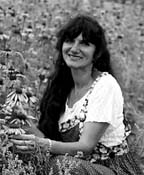|
Interview with
Rosemary
Gladstar |
|
||
|
FREE!
|
Dennis Hughes: I know you used to live in my area, in Sonoma County, California. How long has it been since you moved? Rosemary Gladstar: You know, it’s a funny thing, when I tour and lecture around the country people still think I live in California, even though I’ve been in Vermont for many years now. People still say "Do you still have your shop in California?" I was actually born in Sonoma County which is the same county where my father was born and my mother was raised in Kenwood, on a dairy called Wildwood Dairy, which later became an herb nursery. I think it’s fun when I see these full circles happening. I lived in Sonoma County for nearly 40 years. I love Sonoma County! That’s one of the reasons I’m delighted to do this interview with a Northern California publication. Dennis: When did Rosemary’s Garden, your store, first open? Rosemary:
It grew out of my herbal work and was started
in 1972. Dennis: Using plants is traditional--it goes back before formal education. Rosemary:
Absolutely! One of the things I see happening
is we’ve pigeon-holed herbs into a medical system and
they’re really far more about life, than they are about a system
of healing. They’re about vitality and joy and daily living. So
that’s been one of my missions in my whole career as an
herbalist--trying to bring plants back into a living
modality,
as part of a lifestyle and not limited to the medical system. Rosemary: Yes,
and
they can teach us how to live better here on this
planet.
Watching how plants live and how they give of themselves, how they
give back to the rest of the community that we live in, the plant and
animal kingdoms. The herb store came about mostly as a dream of mine,
giving the earth back to the people. It was at a time when herbs
weren’t readily available. There was no herb store in Northern
California. There was one old one in San Francisco that was a
tremendous model, but there were no other herb stores. Rosemary:
And at that time Chinese herbalism wasn’t what it is now, when
it’s readily available to people. Actually, oftentimes when you
went to Chinatown they wouldn’t even speak English to you, so
you didn’t have the same type of accessibility to Chinese
herbalists that you have now. Rosemary:
Lena does a wonderful job with the store, and
so did Shondeya when she ran it. Rosemary:
I think the underlying thing was, I was really needing a big change.
I was moving into my middle years, often a period of revolution for
people. I was in a major stage of transformation in my life. And I
had a relationship that was sprouting at that time. My friend lived
out here. I had never been to Vermont. He was a catalyst for change,
and I moved cross country and set up a center out here. The freezing
winter weather and new location was a powerful teaching for me. It
grew my wildness--that wild spirit that I have in myself. The
weather embraced that wildness. It takes you deep into the heart of
nature. You’re forced to live cyclically here. Rosemary:
I do. I live on a mountain, surrounded by thousands and thousands of
acres of wilderness. Rosemary: Yes.
We’ve
created a nature center here,
for growing and preserving the heirloom plants. Rosemary:
When I moved to Vermont, I was very remote; there wasn’t a lot
of community around here. And living in the wilderness I became
critically aware of the status of the plants themselves. I began to
recognize that though herbalism was experiencing a tremendous
renaissance and becoming very popular, none of us were really
focusing on the status of the plants. We weren’t really
addressing the facts about how the plants were doing in populations
and what the impact of our harvesting was. There really weren’t
any long term studies of growing and harvesting plants, and what it
would be like 50 or 100 years from now. Rosemary:
Just this year we bought a 370 acre botanical preserve in Ohio that
is incredibly rich. The native species were never harvested or
logged. There are acres and acres of indigenous goldenseal, for
example. We’re turning it into a permanent Botanical Sanctuary
for future generations of herbalists. It’s the first of
it’s kind in the country. Rosemary:
We’re trying to provide a forum for the questions. We have a
Board of Directors comprised of big and small businesses,
practitioners, folklore and herbalists, wildcrafters, so that all
aspects are represented. We need to recognize that this is a problem,
and that if we don’t address it, we are going to be in a
dangerous situation as far as these plants go. Our goal is to
safeguard the herbs. They’re not just here for our use.
They’re here for their own integrity as part of the
environment. Rosemary:
One of the things that is important is to
create work for yourself that is meaningful, that involves you in the
positive. That makes all the difference in the world. You know, you
see all these children around feeling hopeless. It’s a problem
in our society in general. Whether you work for yourself or someone
else doesn’t matter. Making a difference does. MORE HEALTH ARTICLES Home Shop |
||
|
|
|||
|
|
|
||


